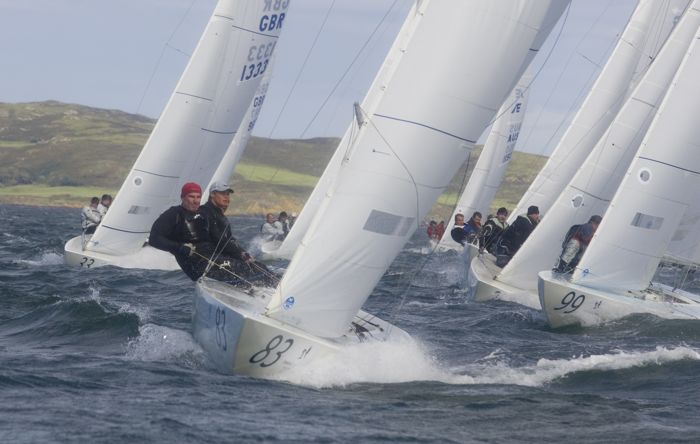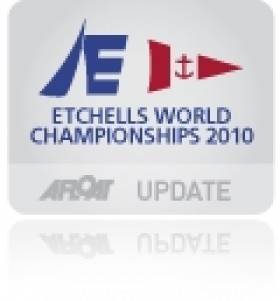Displaying items by tag: Etchells Worlds race 3 and 4
Bertrand double at Howth to lead Etchells Worlds
Two bullets give Australian crew 11 point lead after four races
John Bertrand of Royal Brighton YC in Melbourne gave a masterclass on the waters off Howth to win both races in today's Etchells World Championships, sponsored by Fingal County Council, to open up a significant lead over main rival Ante Razmilovic of the UK.
With crewmen Andrew Palfry and Tom Slingsby, the Australian legend won the first race in light airs and when the wind strength increased, for the second race, their downwind speed in particular was outstanding. Three Australian crews are now in the top five.
Lack of wind early in the day forced an hour's postponement and although light 7-8 knot easterlies prevailed for the duration of the 2-hour race, it was more than adequate for the 41-boat fleet. The championship pace-setters Razmilovic and Bertrand again showed the way, this time with the Melbourne crew notching their second win of the series. Razmilovic's second place put him and Bertrand level on 7 points to extend their position at the top of the leaderboard after three races.
It was a good morning for the European Champion Jay Bourke and crew on 'Northside Dragon' from Howth. They were consistently in the top five for the whole race and claimed third spot by the finish for their best result so far. The next best of the Irish were David Burrows and Dan O'Grady in 12th and 16th places respectively
2009 Worlds runner-up Damien King of Australia, third overall going into the race, had to settle for 9th, a result which allowed the UK's Graham Bailey (5th in the race) to narrow the gap just one point. Nils Razmilovic (Singapore) scored a 6th to move within a point of Bailey.
An increase in wind strength had been forecast for the afternoon and by the start of Race 4, a 10-knot easterly greeted the fleet. It was an Aussie 1-2-3 at the first windward mark with Damien King, Bertrand and Jake Gunther leading the pack but Bertrand's downwind speed gave him the lead by the leeward gate, an advantage which he extended as the race went on.
Laurence Mead of Royal Corinthian YC was in contention throughout the race, finishing a good 2nd ahead of Gunther, Nils Razmilovic (Singapore) and King in 5th. Eighth and ninth for David Burrows and Dan O'Grady represented the leading Irish finishers, with Burrows moving up to 11th in the overall standings. Three points separating 2nd from 4th illustrates how tight the competition is in this premier one-design class
Two races are scheduled for Thursday (26th) with a forecast for stronger wind conditions
Etchells World Championships – after 4 races:
John Bertrand – Australia – 8 points Ante Razmilovic – Britain – 19 points Damien King – Australia – 21 points Nils Razmilovic – Singapore – 22 points Jake Gunther – Australia – 30 points Graham Bailey – Britain – 32 points

John Bertrand leading a race in Howth





























































